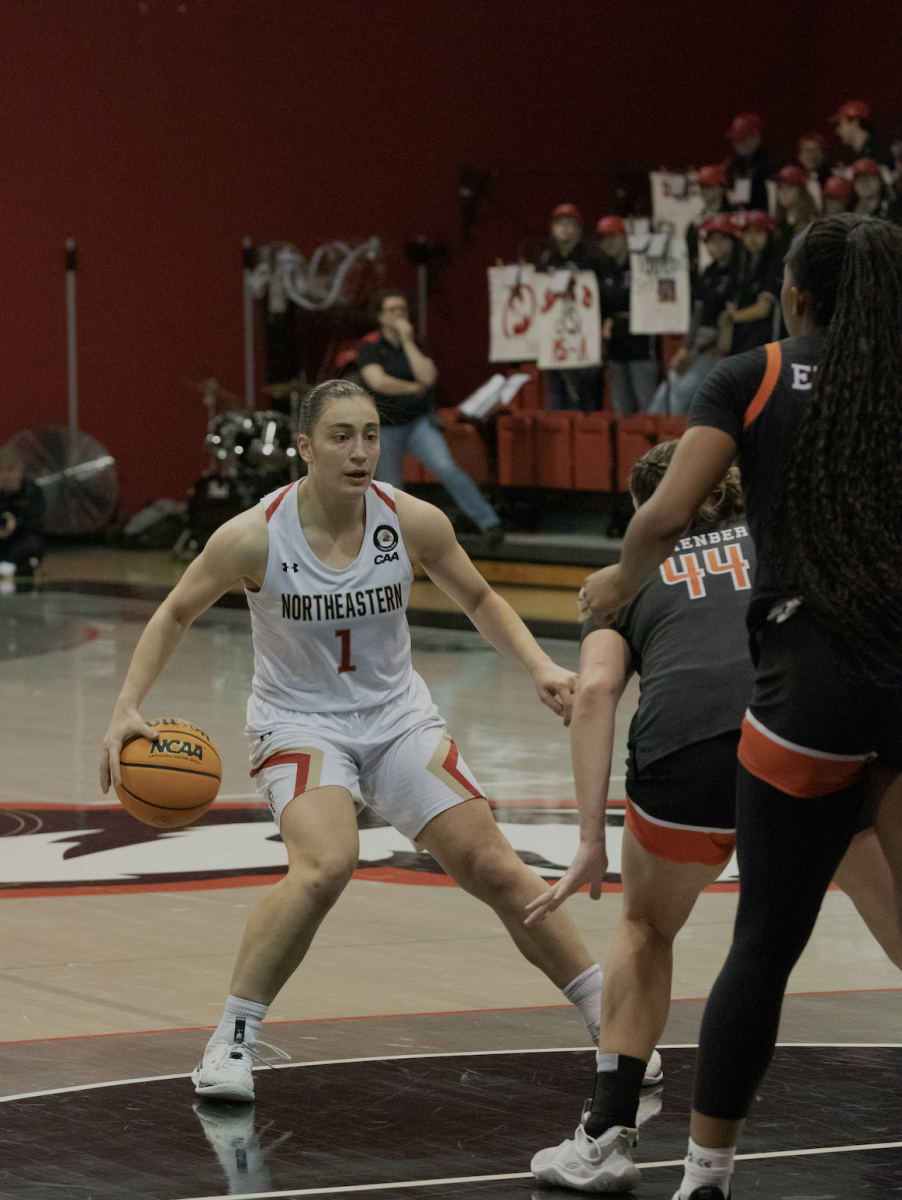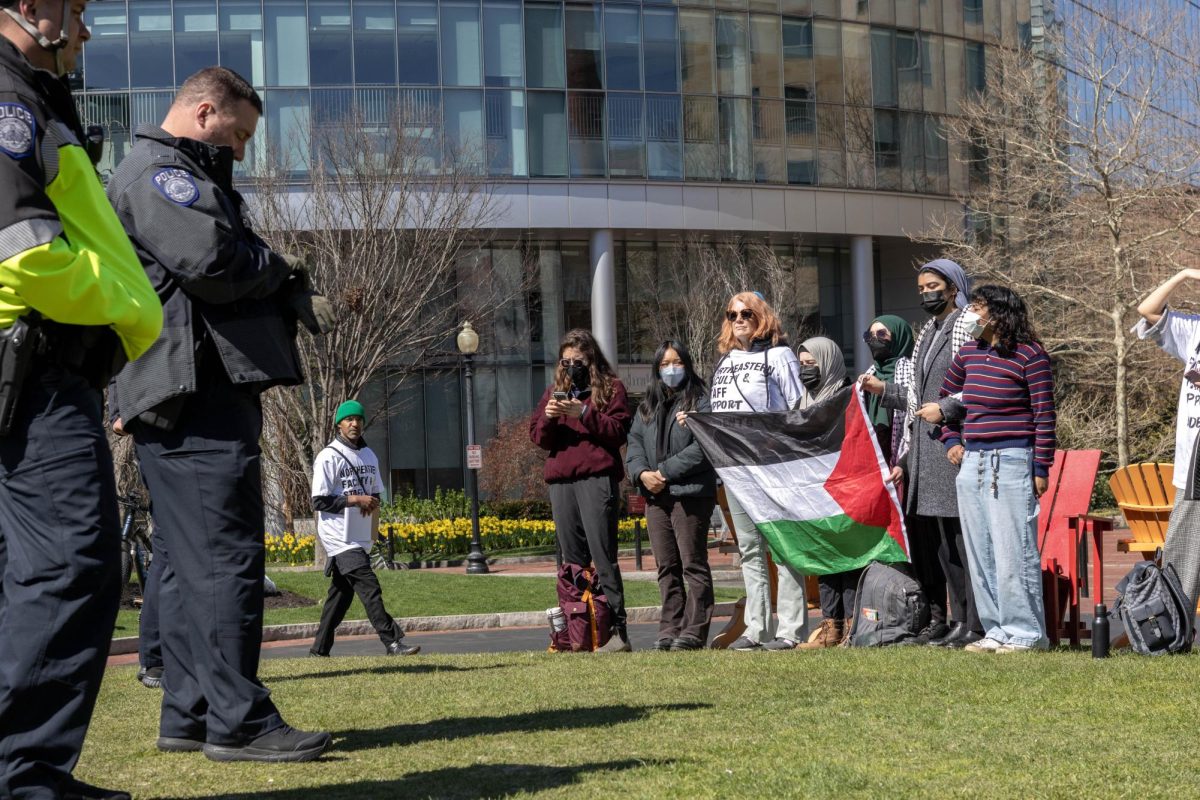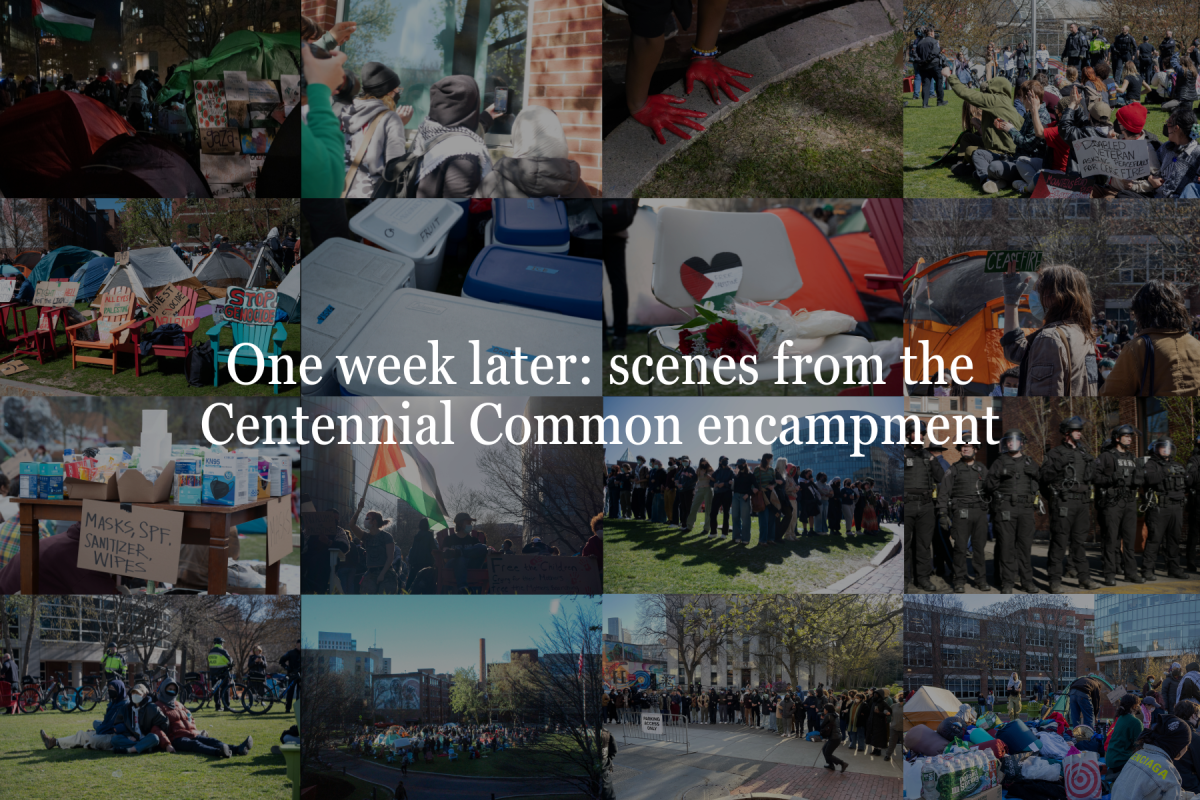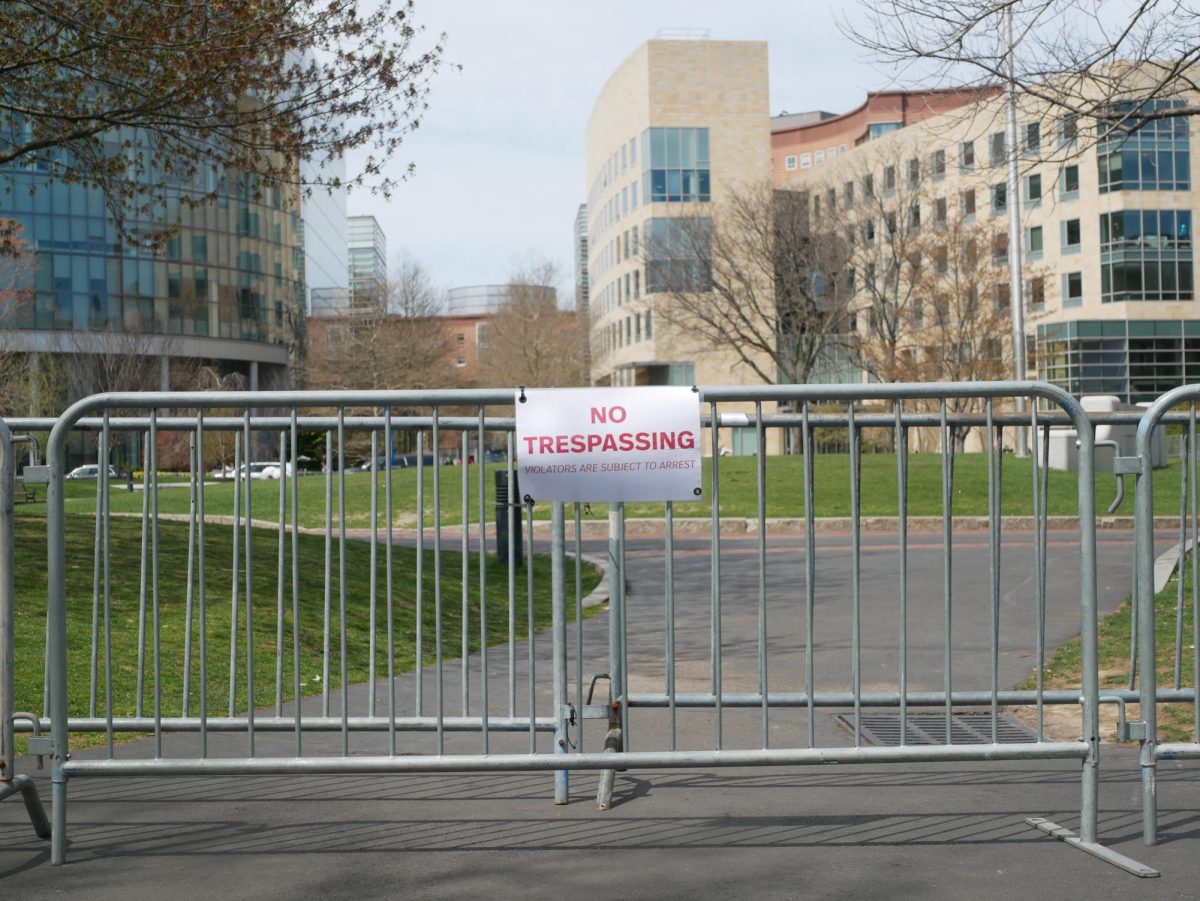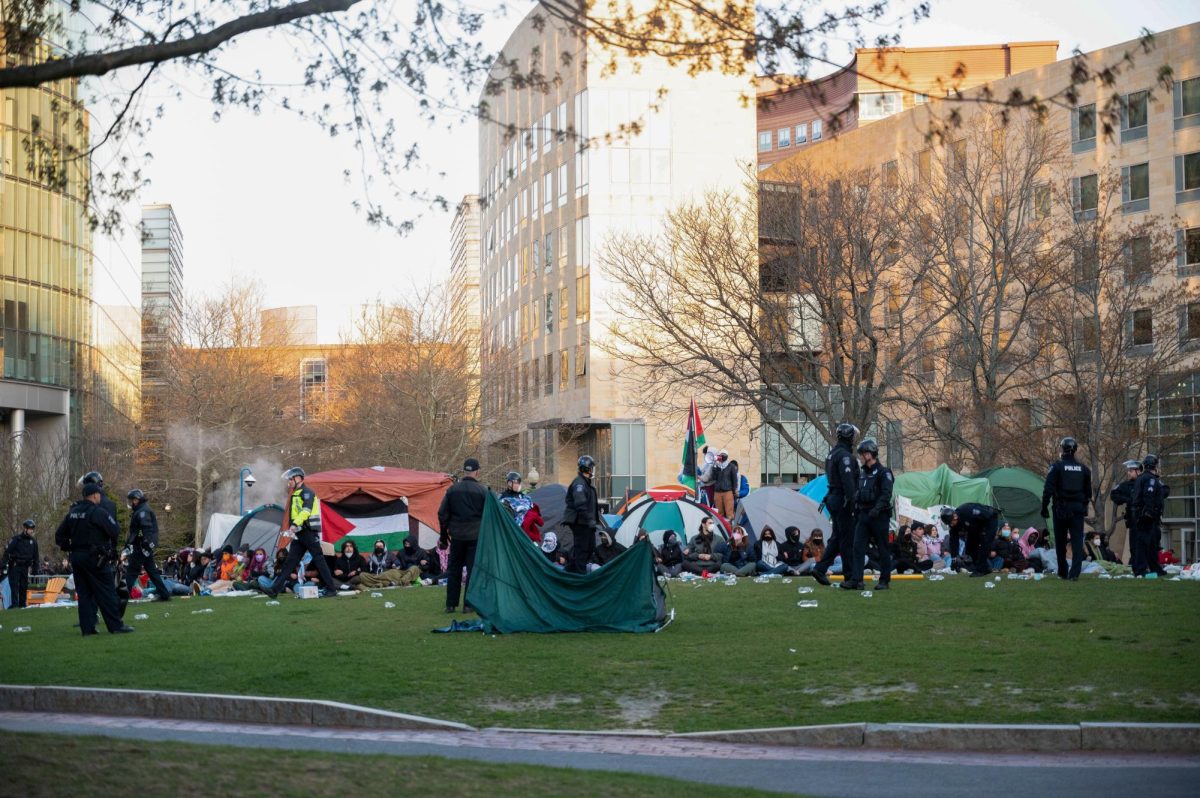Northeastern News: What was the writing process like on this album? I was at the show at the Roxy last year and heard some of these songs, how have they been polished?
Johanna Fateman: It was really fun. It was really great to take more time with this record. It’s been a couple years since “Sweepstakes” came out, and we decided we didn’t want to do the same old thing and have a really strict deadline. We just really wanted to form a special album. When we stopped officially touring “Feminist Sweepstakes” we invested in three matching Pro Tools set ups for our apartments, which is kind of like a dream for us. So when we came off the tour we had the money to do that. We were able to collaborate in a more seamless way in that someone can work on a song and then bring their hard drive over. We can save versions … [and have] vocals cut up and in a different arrangement. You can experiment and not feel like you’re ruining the only master tape of your song. For us, the song writing process is the same as the recording process- we don’t jam.
NN: The song “Tell you now” is getting a lot of praise in Rolling Stone and on Pitchfork, was putting that together any different? I know Ric Ocasek worked on that as well…
JF: That was an interesting experience working with him, but we never worked with anyone that early in the process who listened to our demo of the song and had structuring ideas and had someone who’s really a master of the pop formula. Having someone like that in the process was really rewarding and totally different, but really interesting.
NN: What contributed to jumping on a major label and what’s the transition been like going to Universal?
JF: Well, our old label in the states, Mr. Lady, went out of business and they let us know kind of ahead of time that they were going to stop putting out new things and they were kind of scaling everything back too. That was hard for us because we then had to think of what label do we want to be on and that kind of discussion of looking for labels was kind of happening while we were writing this record and we almost felt like we were making a poppier record so we actually felt like we might be making something that a major label would want and at the same time making something that we felt would be really important to get out in our kind of political climate because … we started writing the record right around the time the United States started bombing Afghanistan. Things were on this steady decline on this road to global disaster when we started writing this record. There were no feminist voices at all in the mainstream and we felt like it would be really great if we could have some kind of a presence to a larger audience. I think it’s been hard in a way, in a sense that making the decision was such an all-consuming discussion that we had to think about from every angle and process as a group and that was kind of draining when all we wanted to do was be artists and make music. That first part of it was exhausting. At the same time, because we’ve been doing everything ourselves for such a long time, it’s been really great to be like “oh this is the person who’s going to take over this job I’ve been doing.” It’s been really great to hand over some of the shit work. And there’s more of an infrastructure to support us with doing what we want to do. So far our experience has been counter to the stereotypical major label experience … The label was really supportive of us releasing “New Kicks” as the first thing off the record and they even gave us a small budget to make a video for that song. So it was kind of like we felt that was really awesome that they were supportive of taking the most explicitly political song, and it’s a song that’s totally not pop, there’s not even our vocals on it so the fact that we got support for that idea made us feel really good; like we could use the machine for our purposes.
NN: The song “Punker Plus” touches on your life on the road a little bit. What’s it like to be on the road for you guys?
JF: It’s super-fun, but part of it is like super-hard. I think it’s really physically tough just because we give a lot to our performances every night so if we feel shitty all day, if there’s a lot of stress … you have to switch into that mode where you’re giving it your all and you don’t always feel like doing that. And actually, I’m glad we put that song on this record because it’s sort of a document of what touring used to be for us. Now we actually have a few more people on tour with us. That way we’re able to do stuff like interviews. Normally it would be like there’s no time because the three of us were totally handling every aspect of tour management and everything. In general, I have to say touring is fun. I think it’s when our music reaches its full potential of meaningfulness, at least to me, because I could really see that we’re connecting with people and we get so much energy back from the audience. We just get a lot of love and that’s just awesome … to go to all these cities and see that there’s a feminist community in every city that we go to. Sometimes it’s like 45 people, sometimes it’s like 2,000 people or whatever, but it’s like that’s the part of it that makes me really happy and makes all the shitty things that happen on the road totally worth it.
NN: Now I was reading some reviews and Spin magazine actually accused you guys of tip toeing around issues more, referencing back to “What’s YR Take on Cassavettes” and “Hot Topic,” saying that the references in Punker Plus about right wing big wigs are not really naming names as much and that has made you not as strong. How do you respond to criticism like that?
JF: I don’t really care that they said that. I don’t really agree first of all. I feel like if the lyrics are less obvious and explicit [it] doesn’t mean they’re not political, things don’t have to be a simple slogan to be radical. In fact, really progressive ideas and progressive ways of looking at the world are pretty complicated. In “Punker Plus,” throwing some lines in like “we want Kissinger on trial” and “we want health care” wasn’t tip toeing around issues, it was showing how these concerns are part of everyday life — like now we’re playing a show, now we’re reading a newspaper and thinking about war crimes and if you’re a feminist or a radical person things are not all separated out like “here’s the party song, here’s the serious song about political issues.” I think actually the way we deal with politics on this record shows that we’re more confident with our subject matter and more confident with who we are. We don’t have to set out to write a political song, the songs are political because of who we are. There’s two songs on the record that are super political. There’s “New Kicks” that’s like “whatever” and then “Seconds” that’s also about Bush so it seems weird to me that anyone would think that we’re tip toeing around issues. There’s also a song about butch lesbian visibility. I guess if you work for Spin magazine you’re only looking for a few catch phrases or something.
NN: How did you get the concept for “New Kicks?”
JF: We did something kind of similar on “Feminist Sweepstakes” called “Dyke March” and I think … what we’re interested in as a band is documenting things and not letting things be lost or forgotten because I feel like when I was younger and just getting into feminism, it was difficult to find feminist history. It was something that really had to be sought out. I searched and there really weren’t that many windows into it, especially in pop culture. Part of what we’re about in these songs is to let people know what we’re about, it’s to let people know that there is a real culture of resistance out there and I think with “New Kicks” in particular this real frustration … with the war in Iraq and feeling of being in a crowd and having this singular purpose that people are united, but watching the news at night and seeing it reported as the tiniest thing. I think we just want to counter that news media narrative of what’s going on with this. It’s like “no it’s really incredible.”
NN: With the world of indie pop dance music growing all the time, and it’s something you guys have been doing for a much longer time than a lot of these other bands out now, do you feel a lot of pressure to up the bar?
JF: I think we always feel a lot of pressure because we’re total perfectionists and we always want to make everything awesome. But I don’t think it’s really a competition with other bands. We just really want to make people happy and really wow our audience. Yeah, there’s more people making punk or dance rock music but they’re not making electronic punk feminist dance rock.
NN: What do you think is the place of riot grrrl and the place of feminism in today’s political and sociological climate?
JF: It doesn’t seem as strong of a movement. Not because it died or failed but just because people moved on. When I see things like the way Ladyfests are happening I see that as an offshoot of riot grrrl activities, that lineage. I think people are hearing feminist activism and making feminist art under all types of different banners. We just came back from Europe and we played in Slovenia and it really put things in perspective. Going to eastern Europe and there are things that unite feminists, but really direct local issues, impact what the priorities have to be for feminists. I’m sort of thinking of it in an international perspective. For me, the most important thing as a feminist right now is to get Bush out of office. I sort of feel like I have to put other struggles on the back burner almost, just for the moment, because there’s nothing more important to our country and to the world right now than to get him out of office.


